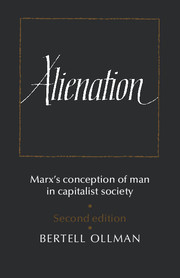Book contents
- Frontmatter
- Contents
- Preface to the second edition
- Note on translations
- Acknowledgements
- General introduction
- PART I PHILOSOPHICAL INTRODUCTION
- PART II MARX'S CONCEPTION OF HUMAN NATURE
- PART III THE THEORY OF ALIENATION
- 18 The theory of alienation
- 19 Man's relation to his productive activity
- 20 Man's relation to his product
- 21 Man's relation to his fellow men
- 22 Man's relation to his species
- 23 The capitalist's alienation
- 24 The division of labor and private property
- 25 The labor theory of value: labor-power
- 26 Value as alienated labor
- 27 The metamorphosis of value
- 28 The fetishism of commodities
- 29 Class as a value Relation
- 30 State as a value Relation
- 31 Religion as a value Relation
- 32 Marx's critique of bourgeois ideology
- PART IV CONCLUSION
- Appendix I In defense of the philosophy of internal relations
- Appendix II Response to my critics: more on internal relations
- Notes to the text
- Bibliography of works cited
- Index of names and ideas
- Cambridge Studies in the History and Theory of Politics
31 - Religion as a value Relation
Published online by Cambridge University Press: 05 June 2012
- Frontmatter
- Contents
- Preface to the second edition
- Note on translations
- Acknowledgements
- General introduction
- PART I PHILOSOPHICAL INTRODUCTION
- PART II MARX'S CONCEPTION OF HUMAN NATURE
- PART III THE THEORY OF ALIENATION
- 18 The theory of alienation
- 19 Man's relation to his productive activity
- 20 Man's relation to his product
- 21 Man's relation to his fellow men
- 22 Man's relation to his species
- 23 The capitalist's alienation
- 24 The division of labor and private property
- 25 The labor theory of value: labor-power
- 26 Value as alienated labor
- 27 The metamorphosis of value
- 28 The fetishism of commodities
- 29 Class as a value Relation
- 30 State as a value Relation
- 31 Religion as a value Relation
- 32 Marx's critique of bourgeois ideology
- PART IV CONCLUSION
- Appendix I In defense of the philosophy of internal relations
- Appendix II Response to my critics: more on internal relations
- Notes to the text
- Bibliography of works cited
- Index of names and ideas
- Cambridge Studies in the History and Theory of Politics
Summary
Still awaiting discussion as value Relations are religion, ethics, science, family, literature and art. Wherever one travels in the realm of estrangement the story is the same. The fourfold relations of man to his activity, product, fellow men and species in each sphere are the misshapen midgets of what comes into existence in communism. Religion is the only other sphere, however, in which these relations are brought out in any detail. For Marx, ‘Religious estrangement as such occurs in the realm of consciousness, or man's inner life.’ This is contrasted with economic estrangement, ‘that of real life’. Whereas the latter concerns those distortions which are produced by man's efforts to stay alive, the former focuses on the distortions which result from his trying to comprehend this life. The connection Marx sees between the two halves of this dichotomy is expressed in his claim that ‘The religious world is but the reflex of the real world.’ The same disintegration that characterizes material existence characterizes the life of the mind.
As the ‘spontaneous activity of the human imagination, of the human brain and human heart’, religion can be no more advanced than man's powers, together with their real achievements. What Marx says of the abstract thinker can be applied equally to all religious people: ‘his intuition of nature is only the act of confirming his abstraction from the intuition of nature – is only the conscious repetition by him of the process of begetting his abstraction’.
- Type
- Chapter
- Information
- AlienationMarx's Conception of Man in a Capitalist Society, pp. 221 - 226Publisher: Cambridge University PressPrint publication year: 1977



